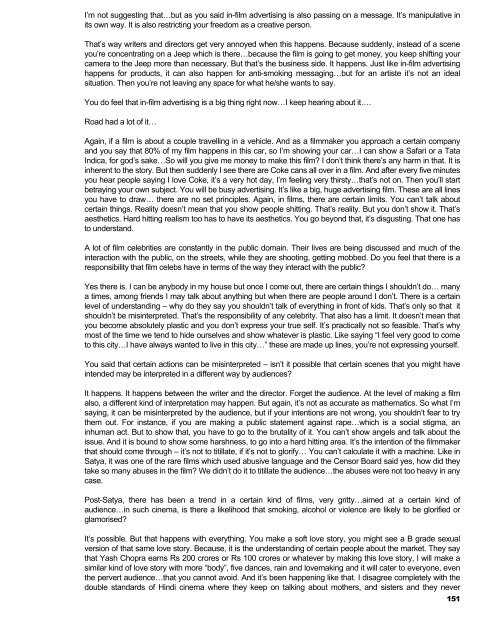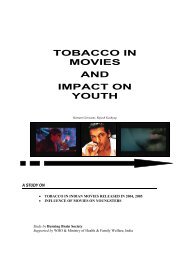Professional Report - Smoke Free Movies
Professional Report - Smoke Free Movies
Professional Report - Smoke Free Movies
You also want an ePaper? Increase the reach of your titles
YUMPU automatically turns print PDFs into web optimized ePapers that Google loves.
I’m not suggesting that…but as you said in-film advertising is also passing on a message. It’s manipulative in<br />
its own way. It is also restricting your freedom as a creative person.<br />
That’s way writers and directors get very annoyed when this happens. Because suddenly, instead of a scene<br />
you’re concentrating on a Jeep which is there…because the film is going to get money, you keep shifting your<br />
camera to the Jeep more than necessary. But that’s the business side. It happens. Just like in-film advertising<br />
happens for products, it can also happen for anti-smoking messaging…but for an artiste it’s not an ideal<br />
situation. Then you’re not leaving any space for what he/she wants to say.<br />
You do feel that in-film advertising is a big thing right now…I keep hearing about it….<br />
Road had a lot of it…<br />
Again, if a film is about a couple travelling in a vehicle. And as a filmmaker you approach a certain company<br />
and you say that 80% of my film happens in this car, so I’m showing your car…I can show a Safari or a Tata<br />
Indica, for god’s sake…So will you give me money to make this film? I don’t think there’s any harm in that. It is<br />
inherent to the story. But then suddenly I see there are Coke cans all over in a film. And after every five minutes<br />
you hear people saying I love Coke, it’s a very hot day, I’m feeling very thirsty…that’s not on. Then you’ll start<br />
betraying your own subject. You will be busy advertising. It’s like a big, huge advertising film. These are all lines<br />
you have to draw… there are no set principles. Again, in films, there are certain limits. You can’t talk about<br />
certain things. Reality doesn’t mean that you show people shitting. That’s reality. But you don’t show it. That’s<br />
aesthetics. Hard hitting realism too has to have its aesthetics. You go beyond that, it’s disgusting. That one has<br />
to understand.<br />
A lot of film celebrities are constantly in the public domain. Their lives are being discussed and much of the<br />
interaction with the public, on the streets, while they are shooting, getting mobbed. Do you feel that there is a<br />
responsibility that film celebs have in terms of the way they interact with the public?<br />
Yes there is. I can be anybody in my house but once I come out, there are certain things I shouldn’t do… many<br />
a times, among friends I may talk about anything but when there are people around I don’t. There is a certain<br />
level of understanding – why do they say you shouldn’t talk of everything in front of kids. That’s only so that it<br />
shouldn’t be misinterpreted. That’s the responsibility of any celebrity. That also has a limit. It doesn’t mean that<br />
you become absolutely plastic and you don’t express your true self. It’s practically not so feasible. That’s why<br />
most of the time we tend to hide ourselves and show whatever is plastic. Like saying “I feel very good to come<br />
to this city…I have always wanted to live in this city…” these are made up lines, you’re not expressing yourself.<br />
You said that certain actions can be misinterpreted – isn’t it possible that certain scenes that you might have<br />
intended may be interpreted in a different way by audiences?<br />
It happens. It happens between the writer and the director. Forget the audience. At the level of making a film<br />
also, a different kind of interpretation may happen. But again, it’s not as accurate as mathematics. So what I’m<br />
saying, it can be misinterpreted by the audience, but if your intentions are not wrong, you shouldn’t fear to try<br />
them out. For instance, if you are making a public statement against rape…which is a social stigma, an<br />
inhuman act. But to show that, you have to go to the brutality of it. You can’t show angels and talk about the<br />
issue. And it is bound to show some harshness, to go into a hard hitting area. It’s the intention of the filmmaker<br />
that should come through – it’s not to titillate, if it’s not to glorify… You can’t calculate it with a machine. Like in<br />
Satya, it was one of the rare films which used abusive language and the Censor Board said yes, how did they<br />
take so many abuses in the film? We didn’t do it to titillate the audience…the abuses were not too heavy in any<br />
case.<br />
Post-Satya, there has been a trend in a certain kind of films, very gritty…aimed at a certain kind of<br />
audience…in such cinema, is there a likelihood that smoking, alcohol or violence are likely to be glorified or<br />
glamorised?<br />
It’s possible. But that happens with everything. You make a soft love story, you might see a B grade sexual<br />
version of that same love story. Because, it is the understanding of certain people about the market. They say<br />
that Yash Chopra earns Rs 200 crores or Rs 100 crores or whatever by making this love story, I will make a<br />
similar kind of love story with more “body”, five dances, rain and lovemaking and it will cater to everyone, even<br />
the pervert audience…that you cannot avoid. And it’s been happening like that. I disagree completely with the<br />
double standards of Hindi cinema where they keep on talking about mothers, and sisters and they never<br />
151



